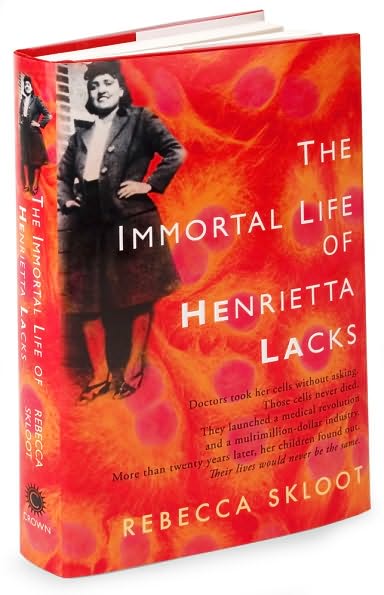Like hundreds, thousands, maybe even millions of people across the world, I’d never heard of Henrietta Lacks. To me, she was a name on the front of a book.
To her family she was a Wife, Mother, Sister, Cousin, Aunt, Grandmother…
To the Doctors and Nurses who treated her, Henrietta was a poor Black woman with cervical cancer. She was treated at her local hospital, and like many other women at the time, Henrietta’s cells were taken and used for tissue culture. It wasn’t until she was admitted to hospital that she was asked to sign her name as consent to receiving treatment(s) as ‘necessary in [the] proper surgical care’.
The Immortal Life of Henrietta Lacks really begins with samples of Henrietta’s cancerous and non-cancerous cells being taken prior to radiation treatment – without her knowledge or consent. It is the story of a lack of education, pride and ignorance; amongst other cultural and social evils, that subjected the Lacks family to decades of fear, recrimination and haunting loss.
The author, Rebecca Skloot first came across Henrietta as a Biology student. Her precocious nature led her to question her college lecturer as to Henrietta’s background; Who was she? Where was she from? Did she know her cells were the single most important discovery in the medical world?
Skloot’s recount of the immortality of Henrietta Lacks’ cells (HeLa) is driven by the personal accounts of friends and family. Skloot and Henrietta’s daughter Deborah, both recognised that there was a need for her legacy to be known. It has taken almost half a century to validate Henrietta Lacks. Who she was, who she is and who she will be, is now a New York Times bestseller, and since its publication in 2010 is on its third reprint.
As I finished reading I wondered if today, anything had really changed.
So what does happen to the many and various appendages excised from us as samples for biopsy? Do they get thrown away, disposed of? And if, as in the case of Henrietta Lacks and her cells, there is a major discovery that could change the world (seriously), is there or should there be a medical or ethical responsibility to inform the owner (read donor)? According to Skloot, where tissues are ‘part of your body, they’re clearly yours. Once they’re excised, your rights get murky.’
But that said, would you really want to know what your tissues were used for after they’d been removed from your body?
It’s all well and good if your cells are used to develop vaccines and new drugs, and had existed in all four corners of the world as we know it, or even contributed to five of the past ten Nobel Prizes for Medicine (as with HeLa), but I think many of us would have some sort of ill feeling, knowing that an inherent part of us had been used to say, develop chemicals for biological warfare.
The Immortal Life Of Henrietta Lacks isn’t a book that I thought I’d enjoy. I imagined that from reading the sensationalised blurb and sleeve notes, the actual story (that I initially assumed was Fiction) would bore me slightly, but on the contrary I really did enjoy this book.
Deep down I’m a bit of a Geek/Nerd (insert le phrase du jour as necessary), so the history and the science within the (true) story I found fascinating, and I love Biographies anyway, so this was a real treat for me.
I’d never heard of Skloot before, but I really enjoyed her writing. Her attention to detail in respect of the story and the scientific background, was woven together exceptionally well; the story and the science weren’t two separate entities. However, as this is Skloot’s first novel, I’m not convinced that there are many more scientific detective stories of this kind, that are worthy of the high praise that The Immortal Life of Henrietta Lacks has already received.




![[bookmark this] Online talk show Know This! TV](https://www.thenublk.com/wp-content/uploads/2011/10/know_this.jpg)
![[Fashion + Style] Style Like U x Fatima Robinson](https://www.thenublk.com/wp-content/uploads/2011/10/fatima.jpg)